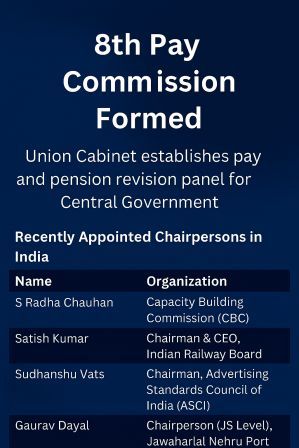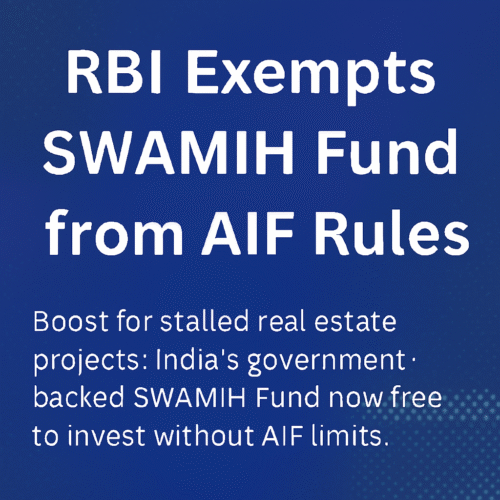🏛️ 8th Pay Commission Formed: Government Sets Up Panel to Revise Salaries, Pensions & Allowances for Central Employees
In a major administrative development, the Union Cabinet has approved the formation of the 8th Central Pay Commission (CPC) to revise the pay structure, allowances, and pension benefits for Central Government employees and pensioners. This move is expected to impact millions of government workers across India and set the tone for public sector compensation over the next decade. times.mitra
👥 Composition of the 8th Pay Commission
The newly constituted commission brings together experts from the judiciary, academia, and administration:
- Chairperson: Justice Ranjana Prakash Desai – Former Supreme Court Judge known for her legal acumen and public service record.
- Part-time Member: Prof. Pulak Ghosh – Renowned data scientist and professor at IIM Bangalore.
- Member-Secretary: Pankaj Jain – Secretary, Ministry of Petroleum & Natural Gas, with extensive experience in governance and finance.
This diverse composition ensures a balanced approach to pay revision, combining legal insight, economic modeling, and administrative feasibility. times.mitra
📅 Timeline & Mandate
The Commission has been directed to submit its report within 18 months of its constitution. Its mandate includes:
- Reviewing existing pay, allowances, and pension structures
- Recommending revisions based on inflation, cost of living, and fiscal sustainability
- Ensuring parity across departments and services
- Suggesting performance-linked incentives and rationalization of pay bands
The recommendations will likely influence the next budget cycle and be implemented in phases post-approval. times.mitra
👨💼 Who Will Be Impacted?
The 8th CPC’s recommendations will affect:
- Central Government employees across ministries, departments, and autonomous bodies
- Pensioners receiving post-retirement benefits
- Defence personnel, paramilitary forces, and civilian staff
- Teachers and staff in central universities and institutions
The ripple effect may also influence state governments, many of which adopt central pay commission models with modifications.
📈 Economic Implications
While pay commissions are often seen as employee-centric reforms, they also have broader economic implications:
- Boost in consumer spending due to increased disposable income
- Stimulus for housing, retail, and services sectors
- Pressure on fiscal deficit if recommendations are not staggered or revenue-neutral
- Inflationary trends depending on the scale of revision
The government is expected to balance employee welfare with macroeconomic stability while implementing the commission’s suggestions. times.mitra
🧩 Context: Previous Pay Commissions
India has had seven pay commissions since independence, each playing a pivotal role in shaping public sector compensation. The 7th CPC, implemented in 2016, introduced:
- A new pay matrix
- Abolition of grade pay
- Rationalized allowances
- Minimum pay of ₹18,000 and maximum of ₹2.5 lakh
The 8th CPC is expected to build on this framework while addressing emerging challenges like digital roles, remote work, and performance metrics.
🧠 Expert Leadership: Justice Desai at the Helm
Justice Ranjana Prakash Desai brings credibility and neutrality to the commission. Her experience in constitutional law, public policy, and judicial reform makes her an ideal choice to lead a panel that must balance employee expectations with national priorities.
Prof. Pulak Ghosh’s expertise in data analytics and behavioral economics will help model compensation structures that are both fair and efficient. Pankaj Jain’s administrative experience ensures that recommendations are implementable and aligned with government processes. times.mitra
🗂️ Recently Appointed Chairpersons in India
The formation of the 8th CPC comes amid a wave of high-level appointments across key institutions:
| Name | Organization |
|---|---|
| S Radha Chauhan | Capacity Building Commission (CBC) |
| Satish Kumar | Chairman & CEO, Indian Railway Board |
| Sudhanshu Vats | Chairman, Advertising Standards Council of India (ASCI) |
| Gaurav Dayal | Chairperson (JS Level), Jawaharlal Nehru Port Authority |
These appointments reflect the government’s focus on strengthening institutional leadership and governance.
📝 Conclusion: A Step Toward Equitable Compensation
The formation of the 8th Central Pay Commission marks a proactive step by the government to ensure that public sector compensation remains fair, competitive, and aligned with economic realities. With a strong leadership team and a clear mandate, the commission is expected to deliver recommendations that balance employee welfare with fiscal prudence.
As the commission begins its work, stakeholders across ministries, unions, and policy circles will be watching closely. The next 18 months will shape the future of government employment in India — from pay scales to pensions, and from allowances to accountability.

- Also Read:– MG Cyberster Achieves 250+ Sales in 2 Months
For more such updates and latest news on cars and bikes stay connected to times.motormitra.in
Thank you ..




